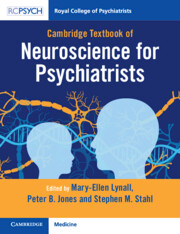Book contents
- Cambridge Textbook Of Neuroscience for Psychiatrists
- Reviews
- Cambridge Textbook of Neuroscience for Psychiatrists
- Copyright page
- Contents
- Contributors
- Introduction
- 1 Cells
- 2 Neurotransmitters and Receptors
- 3 Basic Techniques in Neuroscience
- 4 Neuroanatomy
- 5 Neural Circuits
- 6 Modulators
- 7 Genetics
- 8 Neurodevelopment and Neuroplasticity
- 9 Integrated Neurobiology of Specific Syndromes and Treatments
- 9.1 Autism
- 9.2 Attention Deficit Hyperactivity Disorder
- 9.3 Drug Use, Addiction, Tolerance, Withdrawal and Relapse
- 9.4 Anxiety Disorders
- 9.5 Post-Traumatic Stress Disorder
- 9.6 Obsessive–Compulsive and Related Disorders
- 9.7 Major Depressive Disorder
- 9.8 Bipolar Affective Disorder
- 9.9 Psychosis
- 9.10 Schizophrenia
- 9.11 Borderline Personality Disorder
- 9.12 Self-Harm and Suicidality
- 9.13 Medically Unexplained Symptoms
- 9.14 Delirium
- 9.15 Perinatal Disorders
- 9.16 Sleep Disorders
- 9.17 Eating Disorders
- 9.18 Epilepsy and Seizures
- 9.19 Electroconvulsive Therapy
- 9.20 Brain Stimulation
- 10 Neurodegeneration
- Index
- References
9.9 - Psychosis
from 9 - Integrated Neurobiology of Specific Syndromes and Treatments
Published online by Cambridge University Press: 08 November 2023
- Cambridge Textbook Of Neuroscience for Psychiatrists
- Reviews
- Cambridge Textbook of Neuroscience for Psychiatrists
- Copyright page
- Contents
- Contributors
- Introduction
- 1 Cells
- 2 Neurotransmitters and Receptors
- 3 Basic Techniques in Neuroscience
- 4 Neuroanatomy
- 5 Neural Circuits
- 6 Modulators
- 7 Genetics
- 8 Neurodevelopment and Neuroplasticity
- 9 Integrated Neurobiology of Specific Syndromes and Treatments
- 9.1 Autism
- 9.2 Attention Deficit Hyperactivity Disorder
- 9.3 Drug Use, Addiction, Tolerance, Withdrawal and Relapse
- 9.4 Anxiety Disorders
- 9.5 Post-Traumatic Stress Disorder
- 9.6 Obsessive–Compulsive and Related Disorders
- 9.7 Major Depressive Disorder
- 9.8 Bipolar Affective Disorder
- 9.9 Psychosis
- 9.10 Schizophrenia
- 9.11 Borderline Personality Disorder
- 9.12 Self-Harm and Suicidality
- 9.13 Medically Unexplained Symptoms
- 9.14 Delirium
- 9.15 Perinatal Disorders
- 9.16 Sleep Disorders
- 9.17 Eating Disorders
- 9.18 Epilepsy and Seizures
- 9.19 Electroconvulsive Therapy
- 9.20 Brain Stimulation
- 10 Neurodegeneration
- Index
- References
Summary
Psychosis refers to the state of having a set of experiences and beliefs that do not accord with accepted reality and that seem to arise and persist in ways that do not reflect the evidence available. It is important to remember that the term is descriptive and is not in itself a diagnosis. Indeed, it emerges across a wide range of psychiatric, neurological and other physical disorders as well, in various forms, as a consequence of stress, trauma, drug use and other perturbations to the nervous system. Moreover, attention has more recently focused on the existence of attenuated psychosis-like thinking distributed within the healthy population: a phenomenon that has long been recognised (Taine, 1871) and that become a focus for systematic study more recently (e.g. van Os et al., 2009).
- Type
- Chapter
- Information
- Cambridge Textbook of Neuroscience for Psychiatrists , pp. 456 - 466Publisher: Cambridge University PressPrint publication year: 2023

